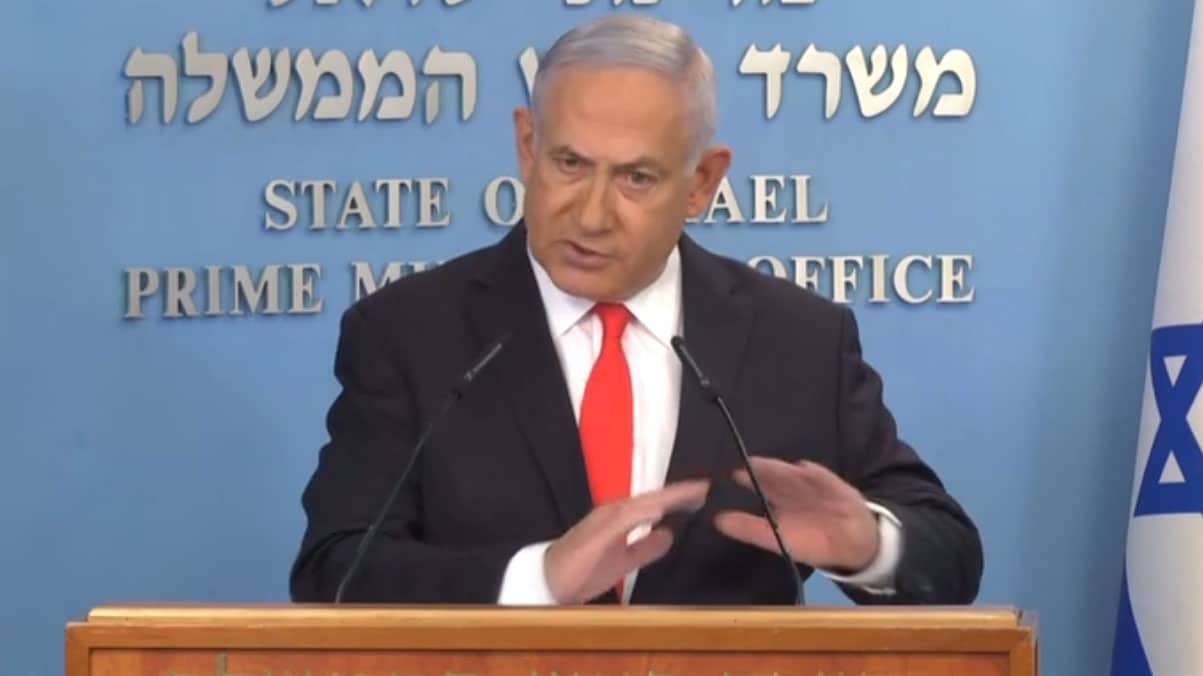 Israeli Prime Minister Binyamin Netanyahu (Screengrab/Channel 12)
Israeli Prime Minister Binyamin Netanyahu (Screengrab/Channel 12) I sure hope Bibi is right.
I say this not as an unadulterated Netanyahu supporter. Like many American Jews, I have admired his economic, security and diplomatic successes over the years. And like many ardent Zionists both here and in Israel, I have been concerned by his recent exercises in judicial tap-dancing and the increasingly troubling coalition-building that his legal troubles have required. But I also try to remind myself that Israelis get to make these decisions for themselves. So I watch from a safe distance (although not feeling quite as safe as I did three months ago) and continue to hope for the best for Israel and its people without presuming that I know what’s best for them.
Since Oct. 7, I’ve watched Netanyahu try to lead his country after the worst atrocity against the Jewish people since the Holocaust. It’s clear that the country’s government, intelligence services and military were woefully unprepared for the Simchat Torah massacre and it appears likely that he will be removed from office for those failures the same way that Golda Meir was replaced after similar breakdowns led to the Yom Kippur War fifty years ago.
Regardless of how much longer Netanyahu remains as Israel’s leader, his current position demands that he articulate a credible strategy for winning the war in the face of mounting international skepticism and domestic exhaustion.
But regardless of how much longer Netanyahu remains as Israel’s leader, his current position demands that he articulate a credible strategy for winning the war in the face of mounting international skepticism and domestic exhaustion. On Christmas Day, he outlined a remarkably ambitious set of goals for the war’s successful resolution in a Wall Street Journal opinion piece. In the opening paragraph, Netanyahu presented his objectives clearly and succinctly:
Hamas must be destroyed, Gaza must be demilitarized, and Palestinian society must be deradicalized.
I want all those things to happen, too. Every Hamas terrorist should be captured, imprisoned or killed. Gaza should be a safe and free place administered by a credible multi-national governing coalition in which its people can work, live and thrive. And Palestinian children should be taught that Judaism and Islam are two of the world’s great religions and that followers of those two faiths can co-exist with mutual respect and affection.
But that could take awhile, to say the least. Although thousands of Hamas fighters have been killed, the high death rates of Israeli military personnel suggest that the terrorist organization will continue the fight for the foreseeable future. The question then becomes not whether Israel should continue to work toward Netanyahu’s goals (of course they should), but rather whether the war against Hamas should continue as it is currently being fought until each of those objectives has been thoroughly and completely accomplished.
Netanyahu correctly argues that leaving Hamas intact will guarantee additional violence against Israel and its people. Yet the terrorist organization’s leaders are reported to have surrounded themselves with Israeli hostages, making the release of the more than 100 remaining captives even more difficult as the war continues. Ongoing combat also requires considerable economic sacrifice for Israel, which is the announced reason for withdrawing thousands of reservists from Gaza in recent days. Worst of all, mounting evidence of the atrocities committed by Hamas fighters on Oct. 7, including systematic rape, sexual abuse and other horrific examples of gender-based mutilation has failed to shift world opinion. Even Israel’s strongest allies are pressing for some type of scaledown as the war enters its fourth month.
Israel certainly cannot stop fighting right now. That would give the terrorists an unacceptable victory and would set the stage for even worse attacks in the future. Netanyahu’s aspirations are both noble and necessary, but eliminating Hamas, transforming Gaza and remaking the Palestinian culture are long-term goals. I want to believe him when he says that achieving all three are necessary conditions before the fighting can stop, but it’s difficult to see such dramatic changes occurring quickly enough for that to happen in the near or medium future.
I hope that Netanyahu’s laudable objectives can be accomplished before the price of Israeli blood, treasure and international isolation become too great to bear. I hope Bibi is right. Or if he’s not, that his successor is developing a more achievable strategy.
Dan Schnur is the U.S. Politics Editor for the Jewish Journal. He teaches courses in politics, communications, and leadership at UC Berkeley, USC and Pepperdine. He hosts the monthly webinar “The Dan Schnur Political Report” for the Los Angeles World Affairs Council & Town Hall. Follow Dan’s work at www.danschnurpolitics.com.























 More news and opinions than at a Shabbat dinner, right in your inbox.
More news and opinions than at a Shabbat dinner, right in your inbox.